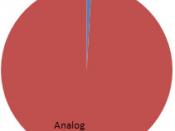Music has always been the world's universal form of communication. The Recording Industry Association of America implies that "it touches every person of every culture on the globe to the tune of $40 billion annually, and the U.S. recording industry accounts for fully one-third of that market" (RIAA). As technology rapidly increases, file sharing amongst consumers becomes faster and easier to do. The new phenomenon of the MPEG Layer 3 encoding (MP3) and the peer-to-peer (P2P) networks present a challenge to the traditional recording and distribution methods of music. MP3 is the fastest growing file format on the internet because it has the ability to convert songs from a CD into a smaller size that can be easily transmitted over the internet. The revolutionary beginning of Napster, a program that uses a P2P network and allows consumers to share MP3 files amongst each other for free, has caused many outrageous issues.
The main controversy involved with MP3 files is that they are being traded around the internet without the consent of the artist or record companies (Boycott-RIAA). In other words, file sharing is considered to be in violation with copyrights. Copyright is the protection of the original expression of an idea and provides a financial backup for those individuals to share ideas and inventions to protect his or her work. Artists that own their own music and copyright already have a number of rights under current federal law that includes "the right to control their production, distribution and adaptation of their work, as well as the public performance or display of their work" (RIAA). Most artists are for the copyright law because they would like to protect their music since they have put much effort and time in making it. For example, heavy metal rock band Metallica and rapper...



Very good
excellent essay about what file sharing is and why it is seen as illegal
2 out of 2 people found this comment useful.